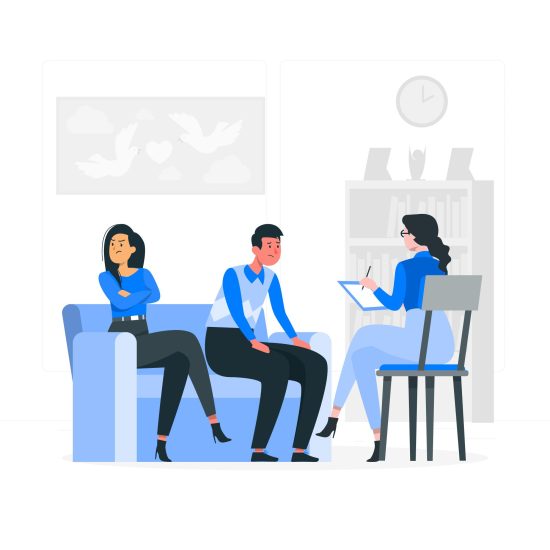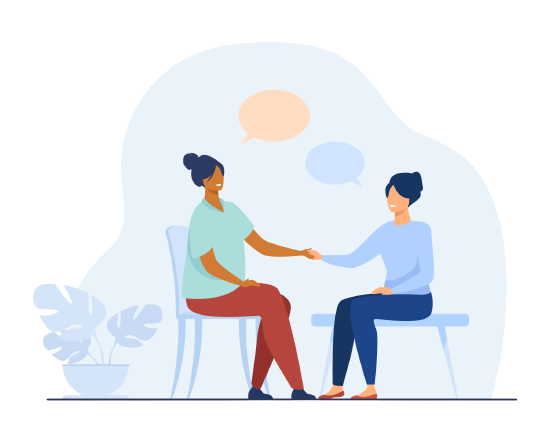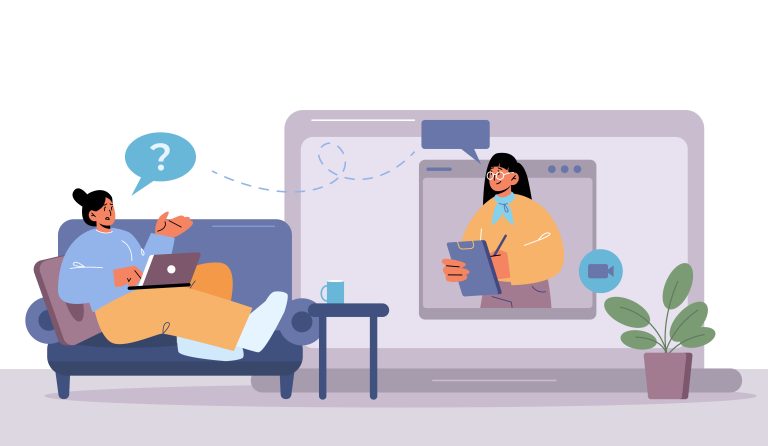
So, you have tried having “the conversation” with your partner about going for couples counseling. You went in with hope, and a tinge of excitement thinking of the possibility of having an unbiased opinion on how to fix and work on your relationship problems.
However, unfortunately, your suggestion was met with resistance.
“What is the need for couples counselling?,”
“We are doing fine?,”
“I am uncomfortable discussing our personal matters with a stranger.”
You might have heard these sentences from your partner when you suggested relationship counseling to them. These responses are common, and normal, considering the fact that therapy can sound like a daunting, and new experience that can make one feel vulnerable and exposed.
How You May Feel When Dealing With Your Partner’s Resistance To Couples Therapy
Let us first address how you are feeling after having these conversations with your partner. This form of resistance can be disappointing, It can make you feel that they aren’t willing to work on their relationship. You may feel rejected, disconnected, and burdened, as you feel that saving the relationship is now solely your responsibility.
Notice what other feelings come up for you after having these conversations. It is highly likely these conversations have created some distance between you and your partner.
In this article, we look at what to do if you partner is resistant to couples counselling by looking at some of the reasons why there may be resistance to relationship therapy, and highlighting some of the ways you can have more fruitful conversations with your partner on how to work on your relationship issues.

Contact Us
Counseling is a process that can help you learn more about yourself and your relationships.
Our Counselors are trained to help you with a wide range of concerns.
If you are interested in scheduling an appointment with us, please click the link below.
Understanding Your Partner’s Resistance To Couples Therapy
While having a conversation with your partner about couples therapy, you may have observed a sense of defensiveness, worry, or fear within them. This could be an indication of their resistance to couples counselling.
Therefore, it is necessary to understand this resistance, and its origin, to be able to get through to your partner.
For this, initiate a conversation that is open and non-judgmental. This means that you don’t do any of the following: You:
- Don’t put the blame on one partner for the relationship problems
- Don’t issue ultimatums such as, “I will leave you if you arent willing to go for couples counselling.”
- Don’t engage in labelling your partner as “irresponsible,” or “lazy,” when they show their disinterest towards counselling.
While doing the above may seem like a natural response to your partner’s refusal, it creates further resentment, avoidance, and ultimately more resistance towards therapy. Sometimes, they may go along with the process as they feel pressured to make a decision. However, they are less likely to stick to counselling if they feel ‘forced’ to do it.
Think about this: How would you feel if you felt pressured to do something, that you did not want to, even if it is good for you?
How to Initiate A Conversation With A Partner That Doesnt Want to Go For Couples Therapy
So, how do you initiate a fruitful conversation with your partner who is resistant? Here are some pointers that may help you out:
- Keep an open mind to their responses: When you listen closely with your guard down, you may notice that they may have some negative beliefs, experiences, and feelings towards therapy.
- Validate their feelings and beliefs: When they express fear towards feeling vulnerable, try telling them, “I understand why therapy can make you feel afraid/vulnerable/exposed/judged.” This helps you hold space for them. They feel seen and heard and they are more likely to be open to sharing their thoughts.
- Try to dispel some of their beliefs and myths surrounding therapy: Knowledge is the way to remove your fear of the unknown. For instance, your partner may be worried that a counsellor may leak or share private information that is shared during sessions. You can try validating their fears about this happening, but you can tell your partner about the confidential nature of therapy. Or you can suggest that you both read up about therapy together.
- Adopt a collaborative approach: Use a “we” approach in your conversations. Instead of sharing why your partner needs to change, highlight how you and your partner will benefit from working on the relationship.
- Clearly Express Why You Feel The Need For Therapy: This is important to help your partner understand why you feel the need for couples counseling. Without blaming your partner, express what are the difficulties you hope will get addressed in couples counseling.
- Convince them for one session: If you partner is unsure about the therapeutic process, try to convince them to attend just one session, where all doubts can be cleared with the therapist. This can alleviate the fear, ambivalence, and false beliefs surrounding therapy. Express how your partner’s collaboration in coming for this one session will help you.
What Are Some Alternatives To Couples Counselling?
If you partner is still resistant towards therapy, you can try offering them a few alternatives such as books on relationships, trying new activities together to build connection and trust, reading articles, and learning healthier ways to communicate. To make this process easier for you, we have compiled a list of articles that can help you below: (put list of articles)
What If My Partner Continues to Refuse Couples Therapy? Can I Take Therapy Alone?
It can feel disappointing and painful if you partner continues to refuse to go for therapy, despite trying these steps. You may begin to feel worried about the future of your relationship. However, their lack of acceptance is not always a negative sign.
This is because their opinion may be subject to change with more time, conversations, and other factors. Therefore, if your requests are met with resistance, the best step for you is to accept their opinion in the present moment.
This is because, they can only try something, such as therapy, when they are ready. Therefore, you can wait with patience, and check-in on them to know how they feel towards therapy in later conversations.
One effective alternative is to try counselling by yourself. Couples counsellors can help you work on your relationship by offering you insights into your relationship dynamics and ways you can improve your relationship.
This can help you work on the relationship yourself, better understand your partner and also share insights with your partner if they are open about it.
In summary, having a conversation with your partner about going in for couples counseling can be difficult. There may be defensiveness, resistance, and fears that your partner may have towards feeling vulnerable and open about your relationship issues with a therapist.
However, validating their concerns, and creating an open, safe and respectful space can help them open up and resolve their apprehensions surrounding relationship counselling.
About the Author
This article was written by Parvathi Ganesan, Counselor at Inner Space. This article was consulted & approved by professional therapists practicing online therapy and counseling.
Learn More
Are you interested to read more about our Individual, Premarital, and Marriage Counseling services? Click below to know more.





